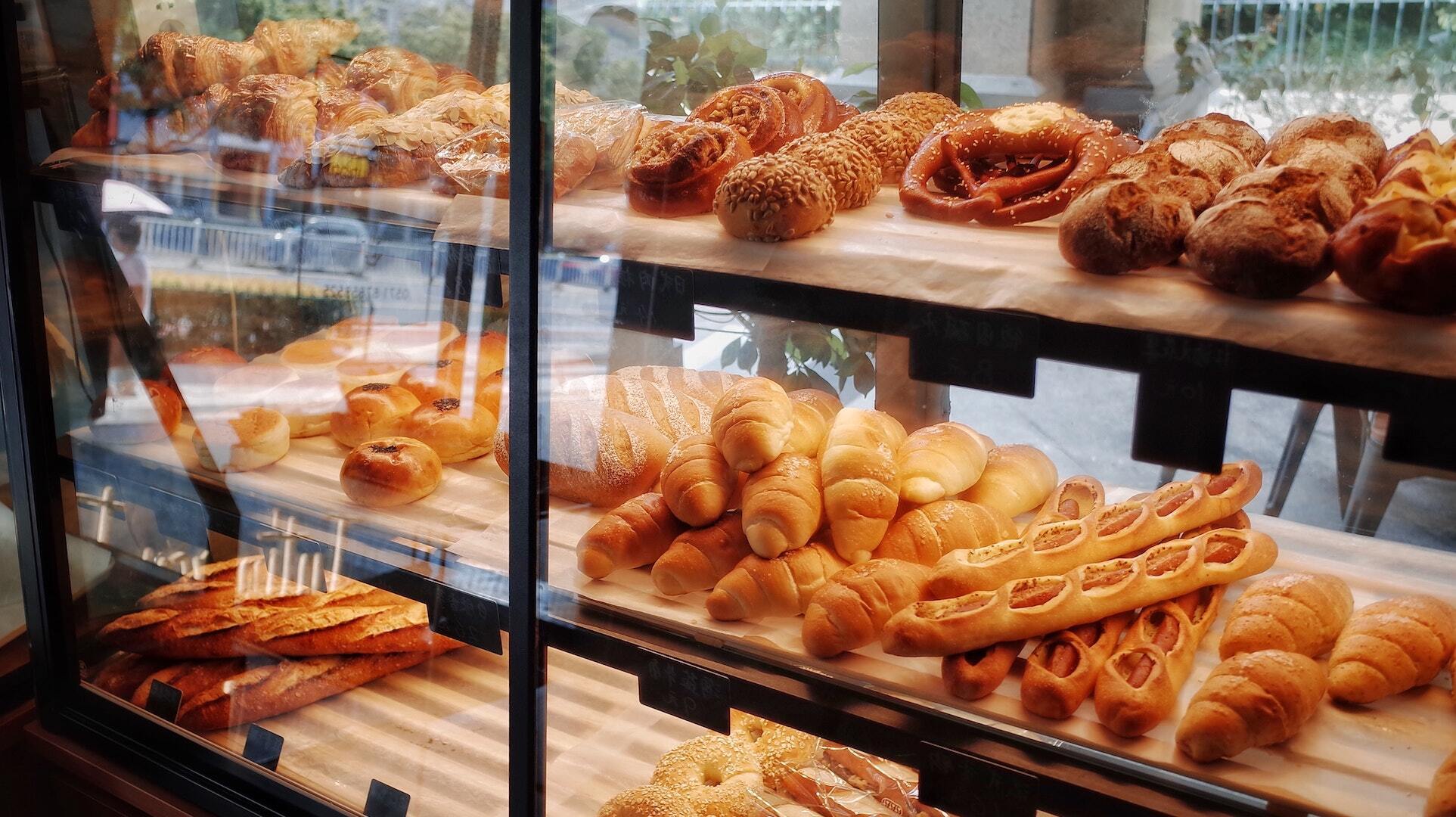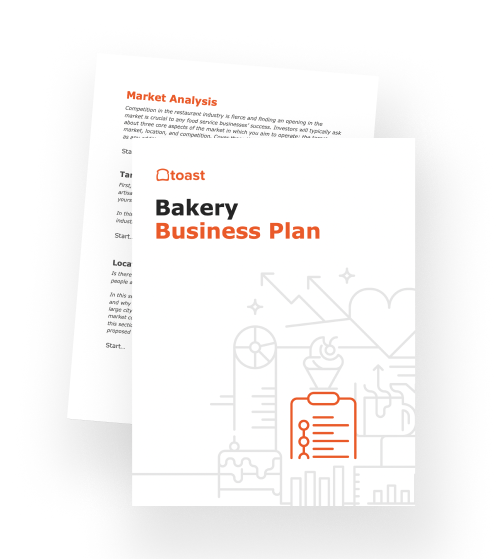
How to Buy a Bakery
Here's your guide to buying a bakery business.
Cinnamon JanzerAuthor

Bakery Business Plan Template
Use this free bakery business plan template to easily create a great business plan that organizes your vision and helps you start, grow, or raise funding for your bakery.
Get Free Download | Built for Restaurants
| Built for RestaurantsWhether you’re a home baker who is ready to make the leap to bakery business owner or a natural-born entrepreneur ready to strike out on your own, starting a bakery business is an exciting proposition.
If you’re ready to translate your delicious baked goods into a booming business, here’s what bakery business owners (and owners-to-be!) need to know.
Buying vs. starting a bakery
Buying an existing bakery likely means that the space will have everything you need to hit the ground running in terms of equipment and the like. The challenge here, though, is finding one with just the right size, equipment, and layout for your unique small bakery business. You’ll also want to be sure to assess the quality of all existing equipment before you sign on the dotted line.
Buying an existing bakery could also come with an existing customer base and possibly even a team of employees. It’s important to understand why the current owners are selling the bakery though — is it just time to move on or has there been a decrease in demand for baked goods in the area?
Starting a brand-new bakery means that you can build out your space to meet your small business’s unique needs. You can choose the location, design the layout, and truly embark on your own. Chances are this will end up being a more expensive endeavor, though, especially if you have to renovate a space to make it work as a new bakery.
How much does it cost to buy a bakery?
The cost of buying a bakery varies as much as the spaces themselves do. But, on average, those in the market for a bakery should plan to spend between $10,000 and $50,000 to open a bakery.
How to buy a bakery
Ready to take the plunge? Here’s a roadmap for buying a bakery.
Determine Your Goals
The first thing to do is get clear about what the bakery business you’re trying to build looks like. What type of bakery are you looking to buy based on the type of business you want to run? Are you looking for a small neighborhood retail bakery or a larger joint that can move into commercial bakery production?
Look at the market
Next, get a good sense of the local bakery industry market. What spaces are for sale in your area? Look at the most popular bakeries in your city or town — what size are they? What do they sell? What makes them successful?
When buying a bakery and starting a restaurant industry business, get a sense of the competition and the holes in your target market that you can fill.
Ask the right questions
Before buying an existing bakery, you should plan to ask the current owners plenty of questions to understand your potential purpose. Here are a few key questions to ask:
Why is the bakery for sale? You’ll want to know if something like a lack of demand or staffing struggles has driven them out of business.
What is the bakery’s reputation? If you’re buying an existing bakery, you’re going to inherit a big chunk of their current customer base. You’ll want to know what the current reputation is like so that you can continue what’s working well and change what isn’t.
What does the competitive landscape look like? Has a corporate competitor come in with hard-to-beat prices? Or is the bakery a neighborhood staple without any competition in sight?
What is the potential profitability? Ask to see their sales numbers over the last year or two. Getting as much data as you can on the business’s profitability will help inform your potential profitability.
Figure out financing
You need to know exactly how much you’re willing to spend and how much you’re able to spend. Then, get preapproved or prequalified for a business loan so you know exactly how much money you have to work with.
There are a number of ways to go about financing — you could crowd source funding or go the traditional route and get a small business loan, a merchant cash advance, a line of credit, or other sources of funding from a bank.
Do your due diligence
Running a bakery is running a small business. That means you’ll have to plan for all the financial, legal, and operational components that all businesses do.
This list is far from exhaustive, but some of the main considerations include to arrive at a bakery’s current valuation include:
Financial performance. Look at the current owner’s financial records, everything from balance sheets and income statements to cash flow statements, tax returns, and the like.
Licensing, permitting, and vendor costs. If you want to serve mimosas with your croissants, you’ll need to factor in the cost of a liquor license. You’ll also likely need business and food service permits. Examine current vendor contracts and decide if you want to renew them or source new vendors.
Employee processes. Especially if you’re inheriting a staff, you’ll need to know what the labor costs are. You’ll also want to understand how staffing, scheduling, pay, benefits, and all things employee-related currently run.
Food costs. How much are the current owners spending on supplies? What’s their current production level?
Equipment and warranties. What are the warranties on the bakery equipment? What are their expected lifetimes? What’s the repairs process currently like?
Zoning and real estate information. How long is the current lease? How large have previous rent increases been? What exactly is the building zoned for?
Hire a lawyer and negotiate a contract
Once you’ve done your due diligence and you’re ready to move forward with buying a bakery, you need to settle on a purchase price and devise a purchase agreement. It pays to hire a lawyer who can cover all contingencies and ensure that the agreement is legally enforceable.
Transition ownership
Are you going to keep or change the bakery’s name? Are you or the previous owner going to handle the agreed-upon renovations? Is there going to be a time during the transition when the bakery will close?
These are all things to cover in a transition plan to new ownership. It’s best to be as detailed as possible in your transition plan so that the business can run as smoothly as possible through the process from previous owner to new owner. Great Harvest offers some excellent examples of bakery succession plans to draw from.
Cafe and Bakery POS Comparison Tool
A free, customizable Cafe and Bakery POS Comparison Tool to research and compare point of sale systems in one Excel spreadsheet or editable PDF.

Congratulations! You’re a Bakery Owner!
There’s a lot to consider, but luckily there are a lot of resources to help. Connect with small business associations in your area for assistance with everything from legal needs to financing options.
The best part? As long as you have a solid business plan based on your unique business needs, you have everything to move through the sometimes time-consuming, stressful, but very doable process of buying a bakery.
Is this article helpful?
DISCLAIMER: This information is provided for general informational purposes only, and publication does not constitute an endorsement. Toast does not warrant the accuracy or completeness of any information, text, graphics, links, or other items contained within this content. Toast does not guarantee you will achieve any specific results if you follow any advice herein. It may be advisable for you to consult with a professional such as a lawyer, accountant, or business advisor for advice specific to your situation.
Read More
Subscribe to On the Line
Sign up to get industry intel, advice, tools, and honest takes from real people tackling their restaurants’ greatest challenges.
By submitting, you agree to receive marketing emails from Toast. We’ll handle your info according to our privacy statement. Additional information for California residents available here

